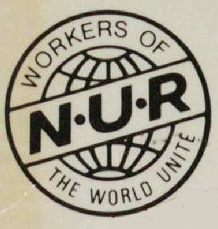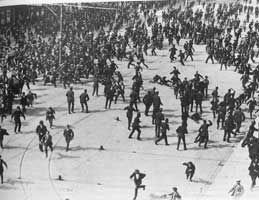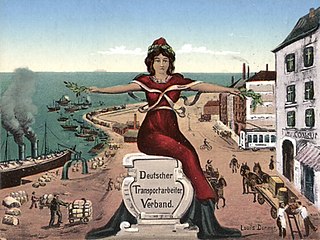Related Research Articles

The Transport and General Workers' Union was one of the largest general trade unions in the United Kingdom and Ireland – where it was known as the Amalgamated Transport and General Workers' Union (ATGWU) to differentiate itself from the Irish Transport and General Workers' Union – with 900,000 members. It was founded in 1922 and Ernest Bevin served as its first general secretary.

The Unión General de Trabajadores is a major Spanish trade union, historically affiliated with the Spanish Socialist Workers' Party (PSOE).
Events from the year 1913 in Ireland.

The National Union of Seamen (NUS) was the principal trade union of merchant seafarers in the United Kingdom from the late 1880s to 1990. In 1990, the union amalgamated with the National Union of Railwaymen to form the National Union of Rail, Maritime and Transport Workers (RMT).

The National Union of Railwaymen was a trade union of railway workers in the United Kingdom. The largest railway workers' union in the country, it was influential in the national trade union movement.
The National Transport Workers' Federation (NTWF) was an association of British trade unions. It was formed in 1910 to co-ordinate the activities of various organisations catering for dockers, seamen, tramwaymen and road transport workers.
The Dock, Wharf, Riverside and General Labourers Union (DWRGLU), often known as the Dockers' Union, was a British trade union representing dock workers in the United Kingdom.

The Dublin lock-out was a major industrial dispute between approximately 20,000 workers and 300 employers which took place in Ireland's capital city of Dublin. The dispute lasted from 26 August 1913 to 18 January 1914, and is often viewed as the most severe and significant industrial dispute in Irish history. Central to the dispute was the workers' right to unionise.

The Australian Workers' Union (AWU) is one of Australia's largest and oldest trade unions. It traces its origins to unions founded in the pastoral and mining industries in the 1880s and currently has approximately 100,000 members. It has exercised an influence on the Australian trade union movement and on the Australian Labor Party throughout its history.
The Workers' Union was a general union based in the United Kingdom, but with some branches in other countries. During the 1910s, it was the largest general union in the UK, but it entered a rapid decline in the 1920s, and eventually became part of the Transport and General Workers' Union (TGWU).
Timeline of trade union history
The Miners' Federation of Great Britain (MFGB) was established after a meeting of local mining trade unions in Newport, Wales in 1888. The federation was formed to represent and co-ordinate the affairs of local and regional miners' unions in England, Scotland and Wales whose associations remained largely autonomous. At its peak, the federation represented nearly one million workers. It was reorganised into the National Union of Mineworkers in 1945.
The Amalgamated Carters, Lurrymen and Motormen's Union was a trade union representing commercial road transport workers in the north of England.
The Cardiff, Penarth and Barry Coal Trimmers' Union was a trade union representing workers involved in trimming coal and loading on to ships, in South Wales.
The Municipal Employees' Association was a trade union representing local government workers in the United Kingdom.
The General Union of Textile Workers was a trade union representing textile workers in England, most of its members being weavers in the West Riding of Yorkshire.

The Amalgamated Association of Tramway and Vehicle Workers (T&VW) was a trade union representing workers on public transport in the United Kingdom.
Tom McLean was a trade unionist and political activist.
Hermann Jochade was a German trade union leader who was murdered by the Nazis.

The German Transport Workers' Union was a trade union representing transport workers in Germany.